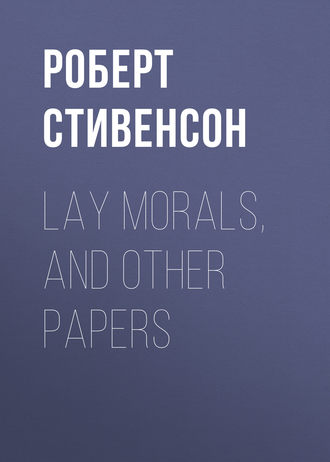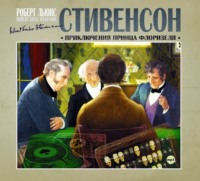 полная версия
полная версияLay Morals, and Other Papers
as to excite any healthy stir among the bulk of this staid company.
The studious congregate about the doors of the different classes, debating the matter of the lecture, or comparing note-books. A reserved rivalry sunders them. Here are some deep in Greek particles: there, others are already inhabitants of that land
‘Where entity and quiddity,‘Like ghosts of defunct bodies fly —Where Truth in person does appearLike words congealed in northern air.’But none of them seem to find any relish for their studies – no pedantic love of this subject or that lights up their eyes – science and learning are only means for a livelihood, which they have considerately embraced and which they solemnly pursue. ‘Labour’s pale priests,’ their lips seem incapable of laughter, except in the way of polite recognition of professorial wit. The stains of ink are chronic on their meagre fingers. They walk like Saul among the asses.
The dandies are not less subdued. In 1824 there was a noisy dapper dandyism abroad. Vulgar, as we should now think, but yet genial – a matter of white greatcoats and loud voices – strangely different from the stately frippery that is rife at present. These men are out of their element in the quadrangle. Even the small remains of boisterous humour, which still clings to any collection of young men, jars painfully on their morbid sensibilities; and they beat a hasty retreat to resume their perfunctory march along Princes Street. Flirtation is to them a great social duty, a painful obligation, which they perform on every occasion in the same chill official manner, and with the same commonplace advances, the same dogged observance of traditional behaviour. The shape of their raiment is a burden almost greater than they can bear, and they halt in their walk to preserve the due adjustment of their trouser-knees, till one would fancy he had mixed in a procession of Jacobs. We speak, of course, for ourselves; but we would as soon associate with a herd of sprightly apes as with these gloomy modern beaux. Alas, that our Mirabels, our Valentines, even our Brummels, should have left their mantles upon nothing more amusing!
Nor are the fast men less constrained. Solemnity, even in dissipation, is the order of the day; and they go to the devil with a perverse seriousness, a systematic rationalism of wickedness that would have surprised the simpler sinners of old. Some of these men whom we see gravely conversing on the steps have but a slender acquaintance with each other. Their intercourse consists principally of mutual bulletins of depravity; and, week after week, as they meet they reckon up their items of transgression, and give an abstract of their downward progress for approval and encouragement. These folk form a freemasonry of their own. An oath is the shibboleth of their sinister fellowship. Once they hear a man swear, it is wonderful how their tongues loosen and their bashful spirits take enlargement, under the consciousness of brotherhood. There is no folly, no pardoning warmth of temper about them; they are as steady-going and systematic in their own way as the studious in theirs.
Not that we are without merry men. No. We shall not be ungrateful to those, whose grimaces, whose ironical laughter, whose active feet in the ‘College Anthem’ have beguiled so many weary hours and added a pleasant variety to the strain of close attention. But even these are too evidently professional in their antics. They go about cogitating puns and inventing tricks. It is their vocation, Hal. They are the gratuitous jesters of the class-room; and, like the clown when he leaves the stage, their merriment too often sinks as the bell rings the hour of liberty, and they pass forth by the Post-Office, grave and sedate, and meditating fresh gambols for the morrow.
This is the impression left on the mind of any observing student by too many of his fellows. They seem all frigid old men; and one pauses to think how such an unnatural state of matters is produced. We feel inclined to blame for it the unfortunate absence of University feeling which is so marked a characteristic of our Edinburgh students. Academical interests are so few and far between – students, as students, have so little in common, except a peevish rivalry – there is such an entire want of broad college sympathies and ordinary college friendships, that we fancy that no University in the kingdom is in so poor a plight. Our system is full of anomalies. A, who cut B whilst he was a shabby student, curries sedulously up to him and cudgels his memory for anecdotes about him when he becomes the great so-and-so. Let there be an end of this shy, proud reserve on the one hand, and this shuddering fine ladyism on the other; and we think we shall find both ourselves and the College bettered. Let it be a sufficient reason for intercourse that two men sit together on the same benches. Let the great A be held excused for nodding to the shabby B in Princes Street, if he can say, ‘That fellow is a student.’ Once this could be brought about, we think you would find the whole heart of the University beat faster. We think you would find a fusion among the students, a growth of common feelings, an increasing sympathy between class and class, whose influence (in such a heterogeneous company as ours) might be of incalculable value in all branches of politics and social progress. It would do more than this. If we could find some method of making the University a real mother to her sons – something beyond a building of class-rooms, a Senatus and a lottery of somewhat shabby prizes – we should strike a death-blow at the constrained and unnatural attitude of our Society. At present we are not a united body, but a loose gathering of individuals, whose inherent attraction is allowed to condense them into little knots and coteries. Our last snowball riot read us a plain lesson on our condition. There was no party spirit – no unity of interests. A few, who were mischievously inclined, marched off to the College of Surgeons in a pretentious file; but even before they reached their destination the feeble inspiration had died out in many, and their numbers were sadly thinned. Some followed strange gods in the direction of Drummond Street, and others slunk back to meek good-boyism at the feet of the Professors. The same is visible in better things. As you send a man to an English University that he may have his prejudices rubbed off, you might send him to Edinburgh that he may have them ingrained – rendered indelible – fostered by sympathy into living principles of his spirit. And the reason of it is quite plain. From this absence of University feeling it comes that a man’s friendships are always the direct and immediate results of these very prejudices. A common weakness is the best master of ceremonies in our quadrangle: a mutual vice is the readiest introduction. The studious associate with the studious alone – the dandies with the dandies. There is nothing to force them to rub shoulders with the others; and so they grow day by day more wedded to their own original opinions and affections. They see through the same spectacles continually. All broad sentiments, all real catholic humanity expires; and the mind gets gradually stiffened into one position – becomes so habituated to a contracted atmosphere, that it shudders and withers under the least draught of the free air that circulates in the general field of mankind.
Specialism in Society then is, we think, one cause of our present state. Specialism in study is another. We doubt whether this has ever been a good thing since the world began; but we are sure it is much worse now than it was. Formerly, when a man became a specialist, it was out of affection for his subject. With a somewhat grand devotion he left all the world of Science to follow his true love; and he contrived to find that strange pedantic interest which inspired the man who
‘Settled Hoti’s business – let it be —Properly based Oun —Gave us the doctrine of the enclitic De,Dead from the waist down.’Nowadays it is quite different. Our pedantry wants even the saving clause of Enthusiasm. The election is now matter of necessity and not of choice. Knowledge is now too broad a field for your Jack-of-all-Trades; and, from beautifully utilitarian reasons, he makes his choice, draws his pen through a dozen branches of study, and behold – John the Specialist. That this is the way to be wealthy we shall not deny; but we hold that it is not the way to be healthy or wise. The whole mind becomes narrowed and circumscribed to one ‘punctual spot’ of knowledge. A rank unhealthy soil breeds a harvest of prejudices. Feeling himself above others in his one little branch – in the classification of toadstools, or Carthaginian history – he waxes great in his own eyes and looks down on others. Having all his sympathies educated in one way, they die out in every other; and he is apt to remain a peevish, narrow, and intolerant bigot. Dilettante is now a term of reproach; but there is a certain form of dilettantism to which no one can object. It is this that we want among our students. We wish them to abandon no subject until they have seen and felt its merit – to act under a general interest in all branches of knowledge, not a commercial eagerness to excel in one.
In both these directions our sympathies are constipated. We are apostles of our own caste and our own subject of study, instead of being, as we should, true men and loving students. Of course both of these could be corrected by the students themselves; but this is nothing to the purpose: it is more important to ask whether the Senatus or the body of alumni could do nothing towards the growth of better feeling and wider sentiments. Perhaps in another paper we may say something upon this head.
One other word, however, before we have done. What shall we be when we grow really old? Of yore, a man was thought to lay on restrictions and acquire new deadweight of mournful experience with every year, till he looked back on his youth as the very summer of impulse and freedom. We please ourselves with thinking that it cannot be so with us. We would fain hope that, as we have begun in one way, we may end in another; and that when we are in fact the octogenarians that we seem at present, there shall be no merrier men on earth. It is pleasant to picture us, sunning ourselves in Princes Street of a morning, or chirping over our evening cups, with all the merriment that we wanted in youth.
CHAPTER III – DEBATING SOCIETIES
A debating society is at first somewhat of a disappointment. You do not often find the youthful Demosthenes chewing his pebbles in the same room with you; or, even if you do, you will probably think the performance little to be admired. As a general rule, the members speak shamefully ill. The subjects of debate are heavy; and so are the fines. The Ballot Question – oldest of dialectic nightmares – is often found astride of a somnolent sederunt. The Greeks and Romans, too, are reserved as sort of general-utility men, to do all the dirty work of illustration; and they fill as many functions as the famous waterfall scene at the ‘Princess’s,’ which I found doing duty on one evening as a gorge in Peru, a haunt of German robbers, and a peaceful vale in the Scottish borders. There is a sad absence of striking argument or real lively discussion. Indeed, you feel a growing contempt for your fellow-members; and it is not until you rise yourself to hawk and hesitate and sit shamefully down again, amid eleemosynary applause, that you begin to find your level and value others rightly. Even then, even when failure has damped your critical ardour, you will see many things to be laughed at in the deportment of your rivals.
Most laughable, perhaps, are your indefatigable strivers after eloquence. They are of those who ‘pursue with eagerness the phantoms of hope,’ and who, since they expect that ‘the deficiencies of last sentence will be supplied by the next,’ have been recommended by Dr. Samuel Johnson to ‘attend to the History of Rasselas, Prince of Abyssinia.’ They are characterised by a hectic hopefulness. Nothing damps them. They rise from the ruins of one abortive sentence, to launch forth into another with unabated vigour. They have all the manner of an orator. From the tone of their voice, you would expect a splendid period – and lo! a string of broken-backed, disjointed clauses, eked out with stammerings and throat-clearings. They possess the art (learned from the pulpit) of rounding an uneuphonious sentence by dwelling on a single syllable – of striking a balance in a top-heavy period by lengthening out a word into a melancholy quaver. Withal, they never cease to hope. Even at last, even when they have exhausted all their ideas, even after the would-be peroration has finally refused to perorate, they remain upon their feet with their mouths open, waiting for some further inspiration, like Chaucer’s widow’s son in the dung-hole, after
‘His throat was kit unto the nekké bone,’
in vain expectation of that seed that was to be laid upon his tongue, and give him renewed and clearer utterance.
These men may have something to say, if they could only say it – indeed they generally have; but the next class are people who, having nothing to say, are cursed with a facility and an unhappy command of words, that makes them the prime nuisances of the society they affect. They try to cover their absence of matter by an unwholesome vitality of delivery. They look triumphantly round the room, as if courting applause, after a torrent of diluted truism. They talk in a circle, harping on the same dull round of argument, and returning again and again to the same remark with the same sprightliness, the same irritating appearance of novelty.
After this set, any one is tolerable; so we shall merely hint at a few other varieties. There is your man who is pre-eminently conscientious, whose face beams with sincerity as he opens on the negative, and who votes on the affirmative at the end, looking round the room with an air of chastened pride. There is also the irrelevant speaker, who rises, emits a joke or two, and then sits down again, without ever attempting to tackle the subject of debate. Again, we have men who ride pick-a-back on their family reputation, or, if their family have none, identify themselves with some well-known statesman, use his opinions, and lend him their patronage on all occasions. This is a dangerous plan, and serves oftener, I am afraid, to point a difference than to adorn a speech.
But alas! a striking failure may be reached without tempting Providence by any of these ambitious tricks. Our own stature will be found high enough for shame. The success of three simple sentences lures us into a fatal parenthesis in the fourth, from whose shut brackets we may never disentangle the thread of our discourse. A momentary flush tempts us into a quotation; and we may be left helpless in the middle of one of Pope’s couplets, a white film gathering before our eyes, and our kind friends charitably trying to cover our disgrace by a feeble round of applause. Amis lecteurs, this is a painful topic. It is possible that we too, we, the ‘potent, grave, and reverend’ editor, may have suffered these things, and drunk as deep as any of the cup of shameful failure. Let us dwell no longer on so delicate a subject.
In spite, however, of these disagreeables, I should recommend any student to suffer them with Spartan courage, as the benefits he receives should repay him an hundredfold for them all. The life of the debating society is a handy antidote to the life of the classroom and quadrangle. Nothing could be conceived more excellent as a weapon against many of those peccant humours that we have been railing against in the jeremiad of our last ‘College Paper’ – particularly in the field of intellect. It is a sad sight to see our heather-scented students, our boys of seventeen, coming up to College with determined views —roués in speculation – having gauged the vanity of philosophy or learned to shun it as the middle-man of heresy – a company of determined, deliberate opinionists, not to be moved by all the sleights of logic. What have such men to do with study? If their minds are made up irrevocably, why burn the ‘studious lamp’ in search of further confirmation? Every set opinion I hear a student deliver I feel a certain lowering of my regard. He who studies, he who is yet employed in groping for his premises, should keep his mind fluent and sensitive, keen to mark flaws, and willing to surrender untenable positions. He should keep himself teachable, or cease the expensive farce of being taught. It is to further this docile spirit that we desire to press the claims of debating societies. It is as a means of melting down this museum of premature petrifactions into living and impressionable soul that we insist on their utility. If we could once prevail on our students to feel no shame in avowing an uncertain attitude towards any subject, if we could teach them that it was unnecessary for every lad to have his opinionette on every topic, we should have gone a far way towards bracing the intellectual tone of the coming race of thinkers; and this it is which debating societies are so well fitted to perform.
We there meet people of every shade of opinion, and make friends with them. We are taught to rail against a man the whole session through, and then hob-a-nob with him at the concluding entertainment. We find men of talent far exceeding our own, whose conclusions are widely different from ours; and we are thus taught to distrust ourselves. But the best means of all towards catholicity is that wholesome rule which some folk are most inclined to condemn – I mean the law of obliged speeches. Your senior member commands; and you must take the affirmative or the negative, just as suits his best convenience. This tends to the most perfect liberality. It is no good hearing the arguments of an opponent, for in good verity you rarely follow them; and even if you do take the trouble to listen, it is merely in a captious search for weaknesses. This is proved, I fear, in every debate; when you hear each speaker arguing out his own prepared spécialité (he never intended speaking, of course, until some remarks of, etc.), arguing out, I say, his own coached-up subject without the least attention to what has gone before, as utterly at sea about the drift of his adversary’s speech as Panurge when he argued with Thaumaste, and merely linking his own prelection to the last by a few flippant criticisms. Now, as the rule stands, you are saddled with the side you disapprove, and so you are forced, by regard for your own fame, to argue out, to feel with, to elaborate completely, the case as it stands against yourself; and what a fund of wisdom do you not turn up in this idle digging of the vineyard! How many new difficulties take form before your eyes? how many superannuated arguments cripple finally into limbo, under the glance of your enforced eclecticism!
Nor is this the only merit of Debating Societies. They tend also to foster taste, and to promote friendship between University men. This last, as we have had occasion before to say, is the great requirement of our student life; and it will therefore be no waste of time if we devote a paragraph to this subject in its connection with Debating Societies. At present they partake too much of the nature of a clique. Friends propose friends, and mutual friends second them, until the society degenerates into a sort of family party. You may confirm old acquaintances, but you can rarely make new ones. You find yourself in the atmosphere of your own daily intercourse. Now, this is an unfortunate circumstance, which it seems to me might readily be rectified. Our Principal has shown himself so friendly towards all College improvements that I cherish the hope of seeing shortly realised a certain suggestion, which is not a new one with me, and which must often have been proposed and canvassed heretofore – I mean, a real University Debating Society, patronised by the Senatus, presided over by the Professors, to which every one might gain ready admittance on sight of his matriculation ticket, where it would be a favour and not a necessity to speak, and where the obscure student might have another object for attendance besides the mere desire to save his fines: to wit, the chance of drawing on himself the favourable consideration of his teachers. This would be merely following in the good tendency, which has been so noticeable during all this session, to increase and multiply student societies and clubs of every sort. Nor would it be a matter of much difficulty. The united societies would form a nucleus: one of the class-rooms at first, and perhaps afterwards the great hall above the library, might be the place of meeting. There would be no want of attendance or enthusiasm, I am sure; for it is a very different thing to speak under the bushel of a private club on the one hand, and, on the other, in a public place, where a happy period or a subtle argument may do the speaker permanent service in after life. Such a club might end, perhaps, by rivalling the ‘Union’ at Cambridge or the ‘Union’ at Oxford.
CHAPTER IV – THE PHILOSOPHY OF UMBRELLAS 35
It is wonderful to think what a turn has been given to our whole Society by the fact that we live under the sign of Aquarius – that our climate is essentially wet. A mere arbitrary distinction, like the walking-swords of yore, might have remained the symbol of foresight and respectability, had not the raw mists and dropping showers of our island pointed the inclination of Society to another exponent of those virtues. A ribbon of the Legion of Honour or a string of medals may prove a person’s courage; a title may prove his birth; a professorial chair his study and acquirement; but it is the habitual carriage of the umbrella that is the stamp of Respectability. The umbrella has become the acknowledged index of social position.
Robinson Crusoe presents us with a touching instance of the hankering after them inherent in the civilised and educated mind. To the superficial, the hot suns of Juan Fernandez may sufficiently account for his quaint choice of a luxury; but surely one who had borne the hard labour of a seaman under the tropics for all these years could have supported an excursion after goats or a peaceful constitutional arm in arm with the nude Friday. No, it was not this: the memory of a vanished respectability called for some outward manifestation, and the result was – an umbrella. A pious castaway might have rigged up a belfry and solaced his Sunday mornings with the mimicry of church-bells; but Crusoe was rather a moralist than a pietist, and his leaf-umbrella is as fine an example of the civilised mind striving to express itself under adverse circumstances as we have ever met with.
It is not for nothing, either, that the umbrella has become the very foremost badge of modern civilisation – the Urim and Thummim of respectability. Its pregnant symbolism has taken its rise in the most natural manner. Consider, for a moment, when umbrellas were first introduced into this country, what manner of men would use them, and what class would adhere to the useless but ornamental cane. The first, without doubt, would be the hypochondriacal, out of solicitude for their health, or the frugal, out of care for their raiment; the second, it is equally plain, would include the fop, the fool, and the Bobadil. Any one acquainted with the growth of Society, and knowing out of what small seeds of cause are produced great revolutions, and wholly new conditions of intercourse, sees from this simple thought how the carriage of an umbrella came to indicate frugality, judicious regard for bodily welfare, and scorn for mere outward adornment, and, in one word, all those homely and solid virtues implied in the term respectability. Not that the umbrella’s costliness has nothing to do with its great influence. Its possession, besides symbolising (as we have already indicated) the change from wild Esau to plain Jacob dwelling in tents, implies a certain comfortable provision of fortune. It is not every one that can expose twenty-six shillings’ worth of property to so many chances of loss and theft. So strongly do we feel on this point, indeed, that we are almost inclined to consider all who possess really well-conditioned umbrellas as worthy of the Franchise. They have a qualification standing in their lobbies; they carry a sufficient stake in the common-weal below their arm. One who bears with him an umbrella – such a complicated structure of whalebone, of silk, and of cane, that it becomes a very microcosm of modern industry – is necessarily a man of peace. A half-crown cane may be applied to an offender’s head on a very moderate provocation; but a six-and-twenty shilling silk is a possession too precious to be adventured in the shock of war.






